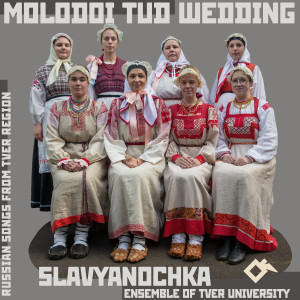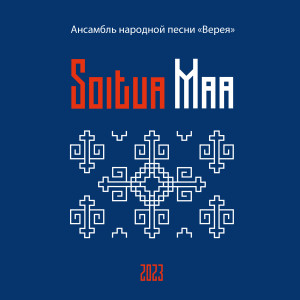Here are two recent recordings by women’s vocal ensembles from different regions of Russia. In these reviews I compare them to other Eastern European women’s vocal groups. I offer the comparisons only as an aid for Western listeners. The comparisons may not be entirely accurate but will give you some idea of the group’s sound.
 Slavyanochka Ensemble of Tver University’s Molodoi Tud Wedding: Russian Songs from Tver Region
Slavyanochka Ensemble of Tver University’s Molodoi Tud Wedding: Russian Songs from Tver Region
Fans of Eastern European polyphonic folk music (Kitka, Bulgarian women’s choirs, Vela Luka, etc.) should check out the music of Slavyanochka Ensemble of Tver University. This expansive album presents unaccompanied vocal music by a women’s ensemble representing Tudovlyans, a Russian subethnic group from the Tver oblast Northwest of Moscow. The songs were collected in the 1980s in the village of Molodoi Tud and represent the entire program of a traditional wedding, plus three more: a game song, a history song, and a love song. (As in my review of Vereya’s Soitua Maa
The Slavyanochka (“Little Slavic Woman”) Ensemble has been based at the Tver State University since 1967, and led by Svetlana Lebedeva since 1988. She’s one of eight women singing on this album.
Most of the songs follow a similar pattern: The theme sung by a soloist as a brief introduction (often in a stylized high, quavering voice), followed by the group’s harmonic performance. A few are solos that are sung-spoken in a stylized manner. As is typical of Russian and Ukrainian songs in my experience, the harmonies are less dissonant than you’ll find in Balkan offerings, but the performances here are fresh, energetic, and professionally performed and recorded. Perhaps a bit much to listen to all 17 tracks in a sitting, but interspersed in a playlist they’re very welcome.
Stream and purchase at Bandcamp.
(Antonovka Records, 2023)
Blending the sounds of Värttinä, Kitka and other women’s vocal ensembles of Slavic and Nordic lands with modern folk-rock arrangements is the Karelian group Vereya on its new album Soitua Maa. The group was formed as an authentic folklore ensemble in 1995 in the city of Sortavala, in the Russian Karelian oblast that borders the Karelian region of Finland. This new release is the first attempt by founding director Margarita Berezhnaya to perform and record these songs in modern settings, and it succeeds quite well for the most part.
I always welcome the Karelian instruments jouhikko (a violin) and kantele (a zither), and these are used to great effect here, along with a traditional shepherd’s flute called “pilli.” To these are added an accordion, electric bass and some folk-rock drums, most often resulting in some excellent vibes. Sometimes the rhythm section is a bit too modern and electronic sounding for my taste, as with the accompaniment on Track 5, “Частушки под язык,” which Google translates as “Ditties Under The Tongue” — a fine song, I’m just not crazy about the arrangement and production. Track 9, which has a Finnish title that’s translated as “Brown Girls,” goes full Jethro Tull with distorted electric guitar, rock drums and very forward bass, and a wild flute solo. Very entertaining if that’s what you’re in the mood for!
But the true focus of Vereya’s music is the vocals, and they’re uniformly great: Multi-part harmonies on songs that are for the most part very upbeat sounding, either dance music or just various kinds of celebrations. It opens strongly with a simple acoustic rendition of the stately Finnish march “Miero Vuotti” (“Miero Died.”) Next up is the soaring “Terveh Tuloa” (Welcome), and then things really kick into high gear with the crazily catchy “Kullervo.” For variety a couple of unaccompanied songs are included, the rapid-fire call and response “Rallli Halli,” and the final (perhaps “hidden”) track “Sansara,” a very traditional sounding polyphonic chorale in the first section; it then adds some syncopated front vocals by a soloist, and some choral sections that feature stirring foot-stomp and hand-clap percussion.
I truly enjoy these multi-part polyphonic women’s songs in their modernized settings, but I also wouldn’t mind hearing them in more traditional arrangements! Vereya seems to have a limited online presence at this point, mostly on the Russian social media site VK.com, and a few of their earlier songs used in audio collages as part of a film soundtrack. You should be able to listen to the songs from this album on this VK page. And Vereya’s VK page is here, but it’s only useful if you’re a Russian speaker. They also have a limited presence on Spotify, where you can listen to three songs, including “Tsihi Tsihi,” which is previewed here.
(Vereya, 2023)

